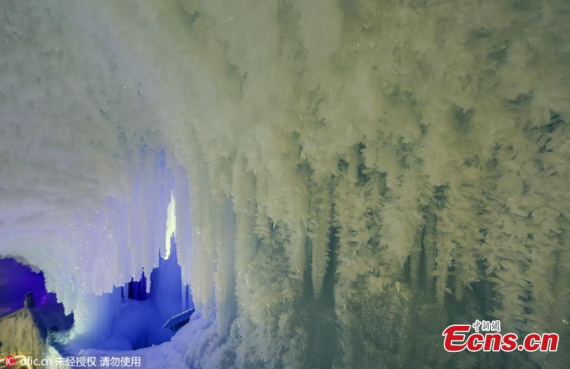
Located 50 kilometers west of Ningwu county, north China's Shanxi province, Luyashan ice cave was formed in the glacial epoch in the quaternary period three million years ago. (Photo/IC)
The huge ice cave near Madigou Village has been something of an enigma for generations. But for villager Zhang Baolin, the cold cave has brought comfort to a once difficult life.
Zhang, a villager in Ningwu County in north China's Shanxi Province, works as a parking lot attendant at the Ningwu Ice Cave, which the local government opened to the public as a scenic spot in the 1990s.
"I used to make ends meet by toiling in the field," said Zhang, 42. "Now I make about 15,000 yuan (2,215 U.S. dollars) a year working for the tourist area."
China is supporting tourism industry development, with local governments issuing policies to woo tourists, boost local economic growth and create jobs for local farmers.
The country's tourism sector generated more than a quarter of the jobs in the global tourism industry in 2015, according to a report released last week by the Wuhan Branch of the China Tourism Academy.
For Zhang and his fellow villagers, China's tourism boom has brought opportunity and a swarm of visitors to the mysterious site.
The cave, formed about three million years ago, is located near the Fenhe River, the second biggest tributary of the Yellow River. Called the "No. 1 Ice Cave in China," it is now a national-level tourist park. The cave is situated 2,300 meters above sea level. In the summer, the cave's exterior is surrounded by lush green grass and colorful flowers. Inside the cave, ice pillars and frozen waterfalls shimmer and sparkle.
Zhang said that when he was a child, nobody knew what the cave was or how it was formed. All he knew was that the cave served as a natural water tank and refrigerator for his fellow villagers.
"When I was little, there was no clean water source in my village and I would always follow my grandpa to the cave to chop chunks of ice with an axe and pack buckets during dry days," Zhang recalled.
Locals also stored meat in the cave from animals they hunted when the market was bad, Zhang said.
"When the market got better, we would take the animals from the cave and sell them for a decent price," he said.
Years later, wells were dug in the village and fewer people went to collect ice from the cave. As young people began to move to metropolises like Beijing and Guangzhou and people stopped hunting for a living, the cave came to be a mere "topic of conversation."
In the mid-1990s, China's tourism industry began to heat up, and the local government started developing the cave as an attraction. Villagers in Madigou started to work as tour guides and parking lot attendants as well as in catering and other travel-related business.
"At first there were not many tourists and we could not make much money," said Zhang, who has worked at the site for 20 years. "As more promotion and government support came, the number of tourists increased, and so did our income."
In 2005, the cave was named a national geopark. Six years later, it was listed as a 4A Class Tourist Area, the second-best rating in a five-level assessment system for the country's scenic areas.
Currently, the area receives at least 300,000 tourists each year, the latest official statistics showed.
"With the income I make at the site, as well as some work in the field at home, I don't have to worry about poverty," Zhang said.
China's tourism industry generated revenue of 2.9 trillion yuan in the first three quarters of this year, official data showed.
In the village, once home to more than 300 people, only about 40 remain, most of them the elderly and children. Most working-age adults have found employment in tourism, with some cleaning and others opening small shops.
"I can make a few thousand yuan a year here," said one of the cleaners in the park.
"In the past, the cold cave sustained our lives by providing water and preserving our food," said Zhang. "Now it has brought us warmth by enriching our lives."


















































